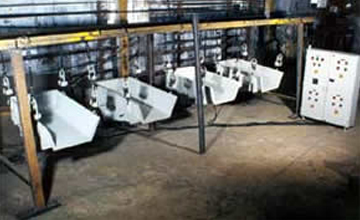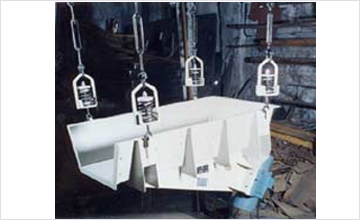Motorized Vibrating Feeders
Motorized Vibrating Feeders are mechanical devices used to transfer bulk materials from one process to another in a controlled and consistent manner using vibration. These feeders are driven by unbalanced motors
that generate vibration to move the material.
Key features of Motorized Vibrating Feeders :
- Efficient Material Handling is designed to convey bulk materials smoothly and uniformly, ideal for continuous processing.
- Vibration Mechanism uses unbalanced motors or electromechanical systems to generate controlled vibrations for movement.
- Vibration amplitude and frequency can be adjusted to control the material flow rate.
- Built with heavy-duty materials like mild steel or stainless steel to handle abrasive or heavy loads.
- Minimal moving parts reduce the need for frequent maintenance and lower downtime.
- Available in various sizes, capacities, and configurations to suit specific applications.
- Often enclosed or fitted with covers to reduce dust emission and maintain clean operation.
- Consumes relatively low power while delivering consistent performance.
- Engineered to operate with reduced noise, improving workplace conditions.
- Easily integrated with other systems for automated processes in material handling lines.
Motorized Vibrating Feeders application industries
Motorized Vibrating Feeders are used across a wide range of industries due to their efficiency in handling,conveying, and feeding bulk materials.
- Mining and Quarrying - Feeding ores, crushed stones, and minerals to crushers and screens.
- Metallurgy - Handling of scrap metal, sintered ores, and other metallic materials in smelting plants.
- Cement and Building Materials - Feeding limestone, clay, sand, and cement raw mix into processing equipment.
- Coal and Power Plants - Feeding coal to crushers, conveyors, or boilers in thermal power plants.
- Food Processing - Conveying grains, pulses, seeds, and powders in hygienic and controlled conditions.
- Chemical Industry - Feeding chemicals, powders, and granules into reactors, mixers, or hoppers.
- Glass and Ceramics - Feeding raw materials like silica, sand, and other minerals into kilns and furnaces.
- Pharmaceuticals - Handling fine powders and granules in controlled and precise dosing operations.
- Fertilizer Industry - Feeding raw materials and granulated fertilizers into processing lines.
- Recycling Plants - Conveying and feeding plastic chips, electronic waste, and scrap for further processing.
- Agriculture and Feed Industry - Feeding animal feed, seeds, and grain to mills or packaging machines.
- Steel Plants - Feeding metallic chips, slag, and additives into furnaces and ladles.
|



